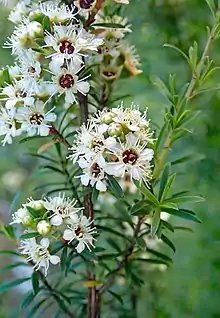Kunzea robusta
Kunzea robusta, commonly known as rawirinui or kanuka,[1] is a tree in the myrtle family, Myrtaceae and is endemic to New Zealand. It has rough, stringy or corky bark, lance-shaped leaves that are darker on the upper surface, flowers in compact groups of up to thirty, each with five or six white petals and about thiry five stamens of varying lengths.
| Rawirinui | |
|---|---|
 | |
| Kunzea robusta growing on the shores of Lake Pupuke | |
| Scientific classification | |
| Kingdom: | Plantae |
| Clade: | Tracheophytes |
| Clade: | Angiosperms |
| Clade: | Eudicots |
| Clade: | Rosids |
| Order: | Myrtales |
| Family: | Myrtaceae |
| Genus: | Kunzea |
| Species: | K. robusta |
| Binomial name | |
| Kunzea robusta | |
Description
Kunzea robusta is a spreading shrub or tree, typically growing to a height of 20–30 m (70–100 ft) with rough, stringy or tessellated bark which peels upward in long strips. The leaves are dark green above, paler below, lance-shaped, varying in size from 3.2 to 28 mm (0.1 to 1 in) long, from 0.7 to 2.5 mm (0.03 to 0.1 in) wide and sessile or with a short petiole. The flowers are white and arranged in compact groups of up to thirty, each flower on a pedicel 1–5 mm (0.04–0.2 in) long. The floral cup is conical to top-shaped or cup-shaped, with five papery sepals about 0.5–1 mm (0.02–0.04 in) long and wide. There are five or six egg-shaped to almost round petals 1.5–4 mm (0.06–0.2 in) long and wide. Between fifteen and sixty stamens, some slightly longer than the petals and others much shorter are arranged in two indistinct rows around the floral cup. Flowering occurs between April and June and is followed by fruit which is a hairy, conical to more or less top-shaped capsule 2.2–4.6 mm (0.09–0.2 in) long and 3.2–5.3 mm (0.1–0.2 in) wide. The capsule usually opens to release its seed when mature.[1][2]
Taxonomy and naming
Kunzea robusta was first formally described in 2014 by the Peter James de Lange from a specimen he collected near Papatea Bay. The description was published in PhytoKeys.[3] The specific epithet (robusta) is a Latin word meaning "hard and strong like oak",[4] referring to the stature of mature trees of this species.[2]
Distribution and habitat
Rawirinui is widespread and common on both the North and South Islands of New Zealand, and has often been confused with K. ericoides. It is mostly found in coastal and low-lying areas and nearby hilly country, especially around forest margins and does not usually grow in upper montane situations.[1][2]
References
| Wikimedia Commons has media related to Kunzea robusta. |
- de Lange, Peter James. "Kunzea robusta". New Zealand Plant Conservation Network. Retrieved 1 April 2019.
- de Lange, Peter J. (2014). "A revision of the New Zealand Kunzea ericoides (Myrtaceae) complex". PhytoKeys. 40 (40): 1–185. doi:10.3897/phytokeys.40.7973. PMC 4154306. PMID 25197228. Retrieved 1 April 2019.
- "Kunzea robusta". International Plant Names Index (IPNI). Royal Botanic Gardens, Kew. Retrieved 1 April 2019.
- Brown, Roland Wilbur (1956). The Composition of Scientific Words. Washington, D.C.: Smithsonian Institution Press. p. 766.